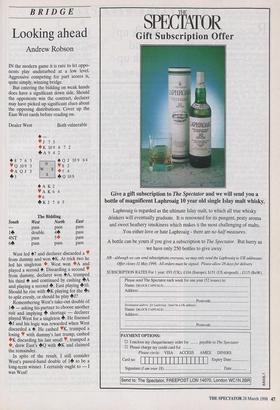BRIDGE
Looking ahead
Andrew Robson
IN the modern game it is rare to let oppo- nents play undisturbed at a low level. Aggressive competing for part scores is, quite simply, winning bridge. But entering the bidding on weak hands does have a significant down side. Should the opponents win the contract, declarer may have picked up significant clues about the opposing distributions. Cover up the East-West cards before reading on.
Dealer West Both vulnerable 4 —• J. 7 5 • K 109 8 7 2 # A 9 4 2 48 7 6 rQ 109 • A QJ 43 3 3 3 4 Q J 109 64 • 8 2 • 5 4 4Q 108 W
N S
E 4 A K 2 • A K 6 4 • 6 4K J 7 6 5
South 1+ 4NT
6# The Bidding West North pass pass double 444 pass 5* pass pass East pass pass pass pass West led 47 and declarer discarded a from dummy and won 4K. At trick two he led his singleton •. West won *A and played a second 4. Discarding a second from dummy, declarer won 4A, trumped his third 4 and continued by cashing 4A and playing a second 4, East playing 410. Should he rise with 4K playing for the #s to split evenly, or should he play 40J? Remembering West's take-out double of 14 — asking his partner to choose another suit and implying 4 shortage — declarer played West for a singleton 4. He finessed 4J and his logic was rewarded when West discarded a 4. He cashed VK, trumped a losing V with dummy's last trump, cashed • K discarding his last small V, trumped a *, drew East's 4Q with 4K and claimed the remainder.
In spite of the result, I still consider West's passed-hand double of 1+ to be a long-term winner. I certainly ought to — I was West!






















































 Previous page
Previous page